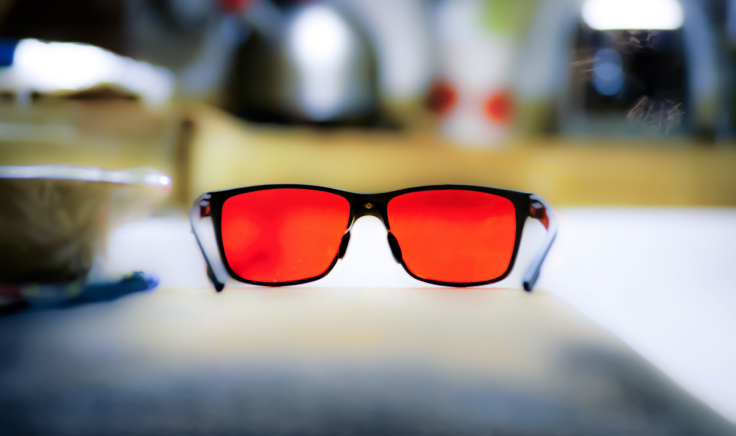Carbonshade Launches Kickstarter Campaign For Blue Light-Blocking Glasses, To Give You A Better Night's Sleep

Blue light is the type of light emitted from cell phones, tablets, and TVs. It can cause various problems for our bodies, affecting everything from our sleep patterns to our eyes. Yet, in a world where people spend large amounts of time staring at their screens for various reasons, it’s not surprising they’ll keep doing it no matter the harm. Thankfully, new technology can help negate some of blue light’s damaging effects.
Carbonshade, a California-based startup, has created the so-called first fashionable blue light-blocking glasses, which the company says will “block the harmful blue and green light that prevents you from getting a good night’s sleep.” However, instead of using orange-tinted lenses, which are found on other versions of blue light-blocking eyewear, Carbonshade uses a red tint.
The glasses are meant to be worn at night and, according to Carbonshade co-founder Jeremy Maluf, with their red lenses and “premium alloy frames,” the company is creating a “novel fashion trend where people will wear glasses at night just because they look stylish,” he told Medical Daily in an email. “The health benefits just become an added perk.”
Light waves fall into six categories: gamma rays, x-rays, ultraviolet (UV) rays, visible light, infrared light, and radio waves. It’s only visible light that (obviously) is visible to the human eyes. This type of light is made up of short, high-energy wavelengths approximately 380 and 500 nanometers long. These wavelengths have been found to be the most damaging to our eyes over long periods.
“This is exactly the range our glasses block,” Maluf said. “Many glasses only block part of this range, or don't effectively block every wavelength, which is why we let people know that our glasses block above 99.8% of the total light in this range.”
Maluf said exposure to blue light can disrupt our natural sleep cycle, and that eliminating it allows our body to produce melatonin, which helps us sleep. Yet despite this supposed chain of events, Maluf still cautions: “[While] our glasses are not intended to treat or cure any disease, many [of the] harmful effects of disrupted circadian rhythms are known, so anything that helps normalize our sleep cycles should have a positive effect.”
Though you could wear the glasses during the day, especially if you spend a lot of time in front of a computer or other blue-light emitting screen, Maluf says our bodies still need some blue light. “For the same reason blue light is harmful at night when your body wants darkness, blue light is a healthy signal during the day,” Maluf said. “That's why it's typically recommended that people get plenty of bright sunlight exposure during the day.”
Carbonshade plans to launch a Kickstarter campaign for the glasses on Feb. 2 — they’ll be sold for $95 each. Maluf said early bird investors will get a discount, so be sure to follow Carbonshade on social media or sign up for its newsletter to get updates on the campaign.
Published by Medicaldaily.com



























